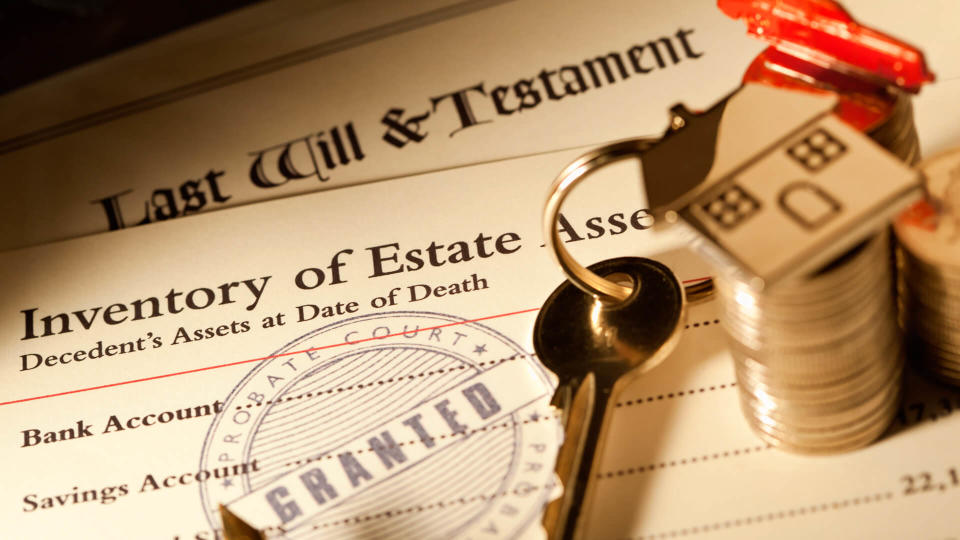I’m a Millennial Who Bought a House With an Inheritance: Here’s What You Should Know

Losing a close family member or friend is usually a devastating and overwhelming event. Getting an inheritance from your loved one can make that difficult time even more challenging.
You want to use the money wisely and in a way that honors the departed. You definitely want to avoid wasting the gift on meaningless splurges.
Find Out: 7 Worst States To Buy Property in the Next 5 Years, According to Real Estate Agents
Learn More: Become a Real Estate Investor for Just $1K Using This Bezos-Backed Startup
Buying a house with your inheritance could be a smart move that helps improve your financial future. GOBankingRates spoke with a millennial who did just that. Keep reading to learn about his experience.
Also see how to use your real estate inheritance to build generational wealth.
Wealthy people know the best money secrets. Learn how to copy them.
Meet Dan McDonald, Millennial Homebuyer
In 2020, at age 25, Dan McDonald used his $50,000 inheritance to help purchase a $500,000 home. The funds gifted to him covered the 3.5% down payment and some renovations. He took out a $475,000 mortgage to finance the rest of the purchase price.
While McDonald still incurred significant debt to buy the residence, he acknowledges that his inheritance made the path to homeownership easier — and faster. “I would have eventually been able to purchase a property, but it would have taken longer,” he said.
Plus, McDonald, founder of House Hack and Hustle, strategically set himself up for long-term financial success by becoming a landlord.
“Because I purchased a duplex and rented out one unit,” he said, “I was able to drastically lower my cost of living expense. I was also getting a far better return than the money sitting in a savings account.”
Check Out: 50 Safest and Most Affordable US Cities To Live In
The Homebuying Process When There’s an Inheritance Involved
McDonald said the homebuying process mainly went as expected despite an inheritance being involved. However, he said there “was extra paperwork and steps for that money to be able to go towards my down payment and secure a loan. Because one parent was still alive and had control over the inheritance funds, it needed to be signed off as a ‘gift.’ [Your lender needs] to verify where the funds are coming from. Be prepared for that.”
When asked if there was any downside to buying the property with his inheritance, McDonald said, “No, I don’t believe so because I took an unconventional route and purchased a duplex. If I bought a standard traditional home, it would not have been as good of an investment.”
McDonald encouraged others to follow in his footsteps and said, “Consider taking a unique route and ‘house hack.’ Buy a property that can also generate rental income.”
If you do, you may be able to avoid the millennial buyer’s remorse many young people are feeling about the homes they’ve purchased in recent years.
What To Do With Your Inheritance
If using gifted funds to buy a house isn’t right for you, there are plenty of other wise investments you can make. Here are a few examples:
If you want your cash to grow but don’t want to risk your account losing value, consider opening a certificate of deposit (CD).
If you’re more comfortable with risk and want the potential of a larger return, you may want to gain exposure to the stock market by buying exchange-traded funds (ETFs).
If you have children, you could open 529 college savings plans for them to reduce their future higher education costs.
If you receive an inheritance, here are some general steps you can take to secure your financial future:
Wait before taking action. Grief can cloud your judgment, so don’t make any snap decisions about how to use the money. Hold off on spending the cash until your mind (and heart) is clear.
Create a strategic plan. Assess your current financial circumstances to determine where the funds would have the greatest impact. Perhaps you have a lot of high-interest debt to pay off, or maybe you’re behind on investing for retirement.
Consider enlisting help. The financial world is complex, so it may be worth hiring a knowledgeable and reputable professional to help you navigate it. They can guide you to make smart decisions regarding investments, taxes, and more.
Give back. Donating part of your inheritance to charity feels good and can be a great way to pay homage to your deceased loved one. Plus, you may be able to write off your gift on your tax return.
More From GOBankingRates
9 Things You Must Buy at Big Lots While on a Retirement Budget
10 Worst Cities To Buy Property in the Next 5 Years, According to Real Estate Agents
This article originally appeared on GOBankingRates.com: I’m a Millennial Who Bought a House With an Inheritance: Here’s What You Should Know